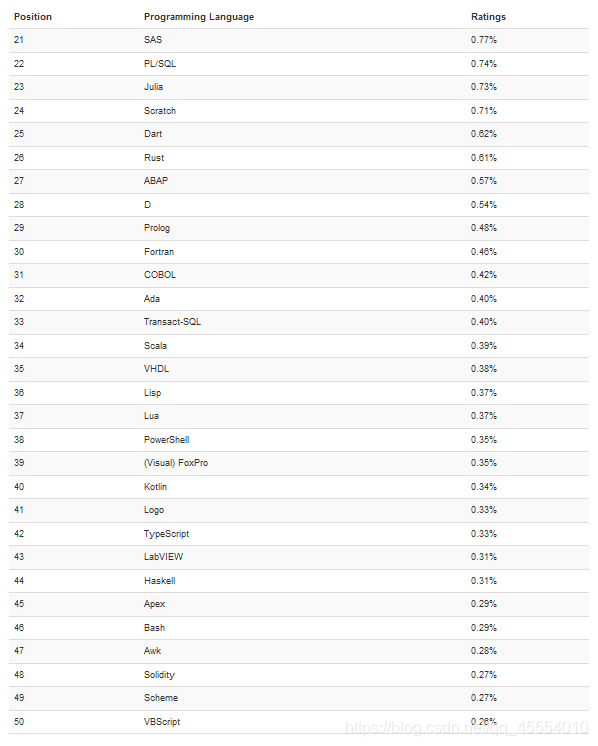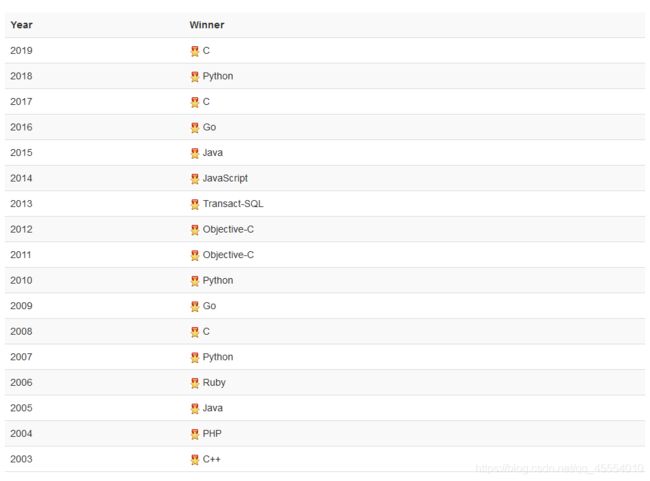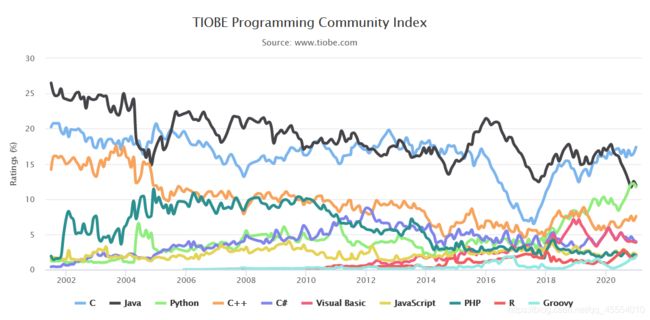2021年1月编程语言排行榜 (TIOBE Index for January 2021):Python第四次成为年度编程语言
January Headline: Python is TIOBE’s Programming Language of 2020!
Python has won the TIOBE programming language of the year award! This is for the fourth time in the history, which is a record! The title is awarded to the programming language that has gained most popularity in one year. Python made a positive jump of 2.01% in 2020. Programming language C++ is a very close runner up with an increase of 1.99%. Other winners are C (+1.66%), Groovy (+1.23%) and R (+1.10%).
It has been stated before: Python is popping up everywhere. It started as a competitor of Perl to write scripts for system administrators a long time ago. Nowadays it is the favorite language in fields such as data science and machine learning, but it is also used for web development and back-end programming and growing into the mobile application domain and even in (larger) embedded systems. The main reasons for this massive adoption are the ease of learning the language and its high productivity. These two qualities are key in a world that is craving for more developers in all kinds of fields. Python already tested the second position some months ago and it will for sure swap places with Java permanently soon. Will Python also beat C? Well, C has still one trump card to play: its performance, and this will remain the case for some time to come. So I guess it will certainly take some years for Python to become the new number 1 in the TIOBE index.
What else happened in the TIOBE index in 2020? C has become number 1 again, beating Java. Java lost almost 5% in only 1 year. Other interesting moves in the top 20 are the statistical language R (from position 18 to 9), and Groovy, which is mainly used for scripting for CI/CD tool Jenkins, from position 23 to 10. Are there any new top 20 entries to be expected in 2021? Top candidate is without doubt Julia, which jumped from position 47 to position 23 in the last 12 months. Dart and Rust are other candidates, but both of them touched the top 20 already without being able to stay for a longer time. - Paul Jansen CEO TIOBE Software
The TIOBE Programming Community index is an indicator of the popularity of programming languages. The index is updated once a month. The ratings are based on the number of skilled engineers world-wide, courses and third party vendors. Popular search engines such as Google, Bing, Yahoo!, Wikipedia, Amazon, YouTube and Baidu are used to calculate the ratings. It is important to note that the TIOBE index is not about the best programming language or the language in which most lines of code have been written.
The index can be used to check whether your programming skills are still up to date or to make a strategic decision about what programming language should be adopted when starting to build a new software system. The definition of the TIOBE index can be found here.
Other programming languages
The complete top 50 of programming languages is listed below. This overview is published unofficially, because it could be the case that we missed a language. If you have the impression there is a programming language lacking, please notify us at [email protected]. Please also check the overview of all programming languages that we monitor.

The Next 50 Programming Languages
The following list of languages denotes #51 to #100. Since the differences are relatively small, the programming languages are only listed (in alphabetical order).
- 4th Dimension/4D, ABC, ActionScript, Alice, Applescript, AutoLISP, B4X, bc, Bourne shell, CIL, CL (OS/400), Clojure, CoffeeScript, Common Lisp, Crystal, cT, Elixir, Emacs Lisp, Erlang, F#, Factor, Hack, Icon, Inform, Io, J, Korn shell, Ladder Logic, LiveCode, Maple, ML, MQL4, NATURAL, Nim, OpenCL, OpenEdge ABL, PILOT, PL/I, PostScript, Q, Ring, RPG, S, Simulink, Small Basic, SPARK, SPSS, Stata, Tcl, Verilog
This Month’s Changes in the Index
This month the following changes have been made to the definition of the index:
- Malgorzata Slota did some research and proposed to add “-healing” for Crystal programming. This has been accepted. Thanks for your suggestion Malgorzata!
- There are lots of mails that still need to be processed. As soon as there is more time available your mail will be answered. Please be patient.
Very Long Term History
To see the bigger picture, please find below the positions of the top 10 programming languages of many years back. Please note that these are average positions for a period of 12 months.

Programming Language Hall of Fame
The hall of fame listing all “Programming Language of the Year” award winners is shown below. The award is given to the programming language that has the highest rise in ratings in a year.


